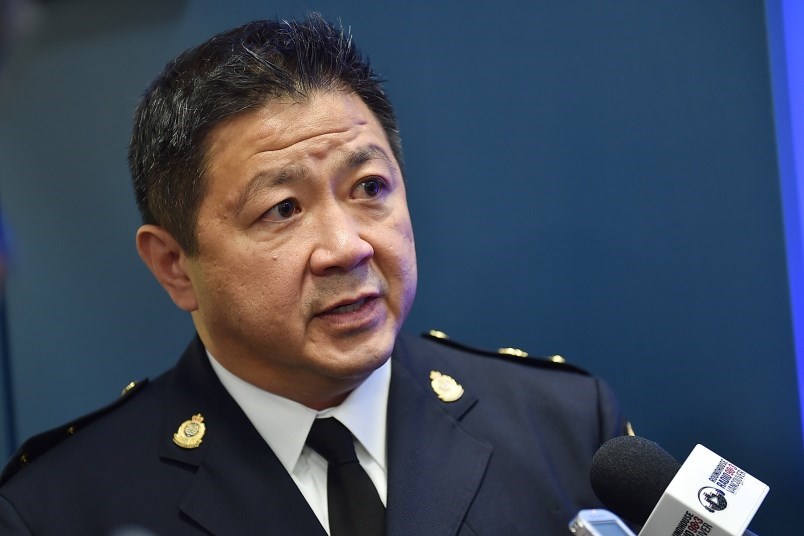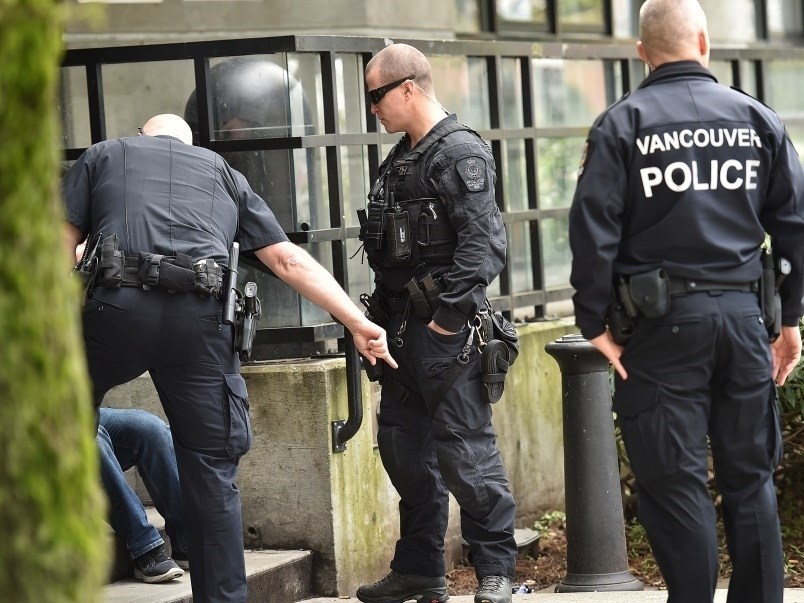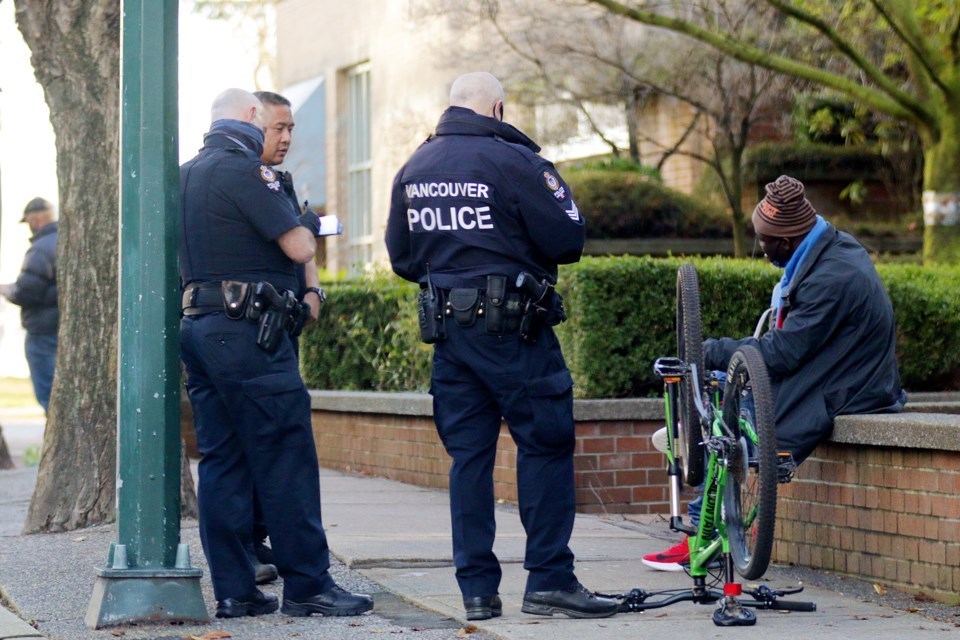That was one of the points former B.C. information and privacy commissioner David Loukidelis made in a 66-page report released Monday on his review of the police board’s hiring of Pyxis Consulting Group Inc. in 2018.
“Of course, the board had no way of knowing in advance that access to field notes would become an issue, but for future arrangements, the board’s services agreement template should contain appropriate clauses to deal with privacy, access to records and the board’s right to obtain copies of service-related records,” said Loukidelis, who was appointed in December 2020 by Brenda Butterworth-Carr, the-then provincial director of police services, to assess how the board selected Pyxis to conduct the review.
Loukidelis was also tasked with reviewing the terms of engagement with the board, how Pyxis’s work was monitored and how its report was finalized, including the decision to delete allegations from the public version of the report concerning the officers’ behaviour during ride-alongs.
“On those issues, I have found no evidence that the process, or the decision, to select Pyxis was tainted by improper considerations or by influence from the department,” he said of the firm operated by a former Edmonton police superintendent. “Further, the department’s lack of familiarity with how to retain and contract with an outside consultant contributed, I conclude, to the board’s decision to involve the department in that process.”
The field notes in question were destroyed by Pyxis researchers, an act which Loukidelis concluded was acceptable and common considering the contract with the police board did not stipulate records be kept upon completion of the work.
The destruction, however, left the police board in a “weak position,” he said.
The notes would have been crucial to the police department identifying two officers who allegedly made inappropriate comments during ride-alongs with researchers, whose observations of the officers’ behaviour ended up in a draft report.

Deputy Police Chief Howard Chow, whom Loukidelis said was angered by the officers' behaviour described in the draft report, attempted to identify the officers via an internal affairs investigation and notified the Office of the Police Complaint Commissioner about the probe.
But because Pyxis shredded the field notes, “it was not possible, ultimately, for and the investigators to identify the officers and the investigation was ended on that basis,” Loukidelis said.
“As for who decided to remove the paragraph, the deputy chief was very clear with me that he did not ask for this to be done,” he said. “He characterized the report as containing far more critical observations and findings about police and how they interact with or treat racialized communities and other groups, such as sex workers. In other words, removing the paragraph was not to the department’s advantage.”
The allegations were not included in the public report because Pyxis decided they were “an outlier” to the whole of the review.
At the same time, Loukidelis said the board or department could have publicly disclosed information about the matter without violating any confidentiality requirements, any privacy rights, or any procedural fairness rights.
“This is again my perspective as a matter of hindsight, and I found absolutely no evidence that the board proceeded as it did for any improper purpose, but hindsight reveals how things could have been handled more transparently,” he said, suggesting media reports at the time about the allegations characterized the omission as “a coverup” by the VPD.

Glacier Media obtained Pyxis’s draft report in July 2020 via a Freedom of Information and Protection of Privacy Act request. The report did not name the officers, and some of the section related to the allegations was redacted.
“On one ride-along…one of the officers made a number of inappropriate, racially insensitive comments to the researcher and his partner throughout the shift,” the report said. “These comments were extremely inappropriate and highly concerning. An officer on another ride-along also made a number of inappropriate comments about vulnerable and marginalized people, and appeared to have considerable anger issues. When interacting with members of the public, he was overly terse and, on one occasion, extremely rude.”
Added the report: “While these officers were clear exceptions, their behaviour and attitude were highly concerning and something the VPD needs to address.”
97,281 street checks
The police board ordered Pyxis to investigate the VPD’s street check policy after the B.C. Civil Liberties Association and the Union of B.C. Indian Chiefs accused the department of discrimination based on police data that showed an overrepresentation of Indigenous and Black people checked between 2008 and 2017.
In June 2018, a request under the Freedom of Information and Protection of Privacy Act required Vancouver police to post data on its website that showed police conducted 97,281 street checks between 2008 and 2017.
Of those checks, 15 per cent (14,536) were of Indigenous people and more than four per cent (4,365) of black people. Indigenous people make up just over two per cent of the population in Vancouver, and Black people less than one per cent.
Pyxis’s final report found that the available data and information gathered during its work could neither confirm nor deny police racism or bias. In the VPD’s own review of street checks in 2018, the report concluded it was “unrealistic and overly simplistic to expect racial and gender populations to align uniformly with crime data.”
Since the initial complaint from the B.C. Civil Liberties Association and the Union of B.C. Indian Chiefs, both organizations learned from Police Complaint Commissioner Clayton Pecknold in a June 5, 2020 letter that allegations concerning the two officers’ behaviour during ride-alongs with researchers was included in a draft report, but deleted from the public report.
Under the Police Act, police officers are compelled to provide statements and answer questions, but civilian witnesses to an incident are not. Pecknold made this point in his letter, saying Pyxis employees couldn’t be compelled to participate in the investigation.
However, Pecknold recommended Butterworth-Carr conduct an analysis of the findings, conclusions and methodology of Pyxis, which is owned and operated by Ruth Montgomery, a former Edmonton police superintendent.
'Increase transparency'
That led to the appointment of Loukidelis, whose review was described Monday by the police board’s vice-chairperson Faye Wightman as an “insightful and thorough assessment” of the board’s handling of the complaint lodged by the human rights groups.
“Since the initial handling of the 2018 complaint, the board has taken many proactive steps towards improving our service or policy process and public communications, in order to increase transparency and openness with those we serve,” Wightman said in an emailed statement. “Mr. Loukidelis has made valuable recommendations, which will guide every police board in the province in creating continued positive change in police oversight and governance.”
Added Wightman: “The public can feel assured that any actions taken by the board are done with the utmost integrity. We are dedicated to governing the Vancouver Police Department in a manner that is fair, impartial, and accountable to the community as a whole.”
Data released in February by the VPD indicated officers conducted substantially fewer street checks on citizens in 2020 — particularly on Indigenous and Black people — than in previous years.
Glacier Media left messages Tuesday with representatives of the Union of B.C. Indian Chiefs and B.C. Civil Liberties Association but had not heard back before this story was posted. Both organizations have called for street checks to be abolished.
Loukidelis, meanwhile, suggested his conclusions will not satisfy all citizens.
“As for my findings, I recognize that my finding no impropriety in the selection of Pyxis, or the monitoring or evaluation of its work, may not be welcomed in all quarters,” he said.
“I can assure readers, however, that my findings are based on close review of, again, thousands of pages of documents and interviews with many individuals. The best I can do is reassure everyone that I have done my work, that I have inquired into the issues, as diligently and thoroughly as possible, and in an independent, neutral, and disinterested manner.”
@Howellings



